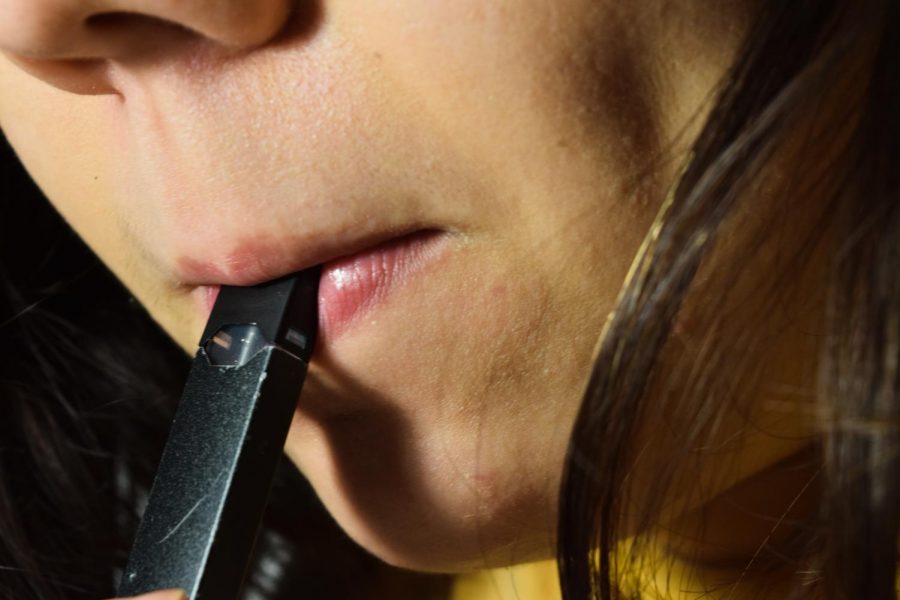Change education on vaping, not age restriciton
Congress votes to change smoking, vaping age to 21; issue better addressed by education campaigns
JOSPEH GARDNER | EVERGREEN PHOTO ILLUSTRATION
Increasing the legal smoking and vaping age to 21 doesn’t solve the issues posed by nicotine. Instead, there should be more programs dedicated to informing people of the risks taken on when using this substance in any form, especially with vaping.
March 19, 2019
The Washington state House of Representatives voted and passed a bill to raise the smoking and vaping age to 21 and is now waiting on the Senate to vote for final confirmation.
This will not stop the uninformed consumption of these products and legislators should instead fund more nicotine education campaigns.
The House’s decision to approve a restriction like this is strange considering many people at this age are expected to be adults. People who are 18 years old or older are held responsible for crimes at a greater penalty, can register to vote, enroll in the draft and buy bolt-action rifles or shotguns.
These people are treated as adults, except they aren’t trusted to use this substance. Yet they’re considered mentally fit to vote on important positions of government, affecting their lives and others far more than their choice to smoke does.
Nicotine abuse is a major problem in the United States, but it is getting better because of education, not restrictive legislation. Over 480,000 people each year die from tobacco-related causes in the United States, a terrifying number that sparked a series of informational campaigns to reduce smoking across the country.
These programs have been incredibly successful as smoking rates dropped from 30 to 14 percent across the nation in twenty years, according to a report by the Center for Disease Control.
Some consider this a temporary success as the popularity of vaping products such as Juuls and Suorins seemed to fill the gap tobacco has left. The Food and Drug Administration already acted against Juul as some of their flavored pods intended to draw in minors to use their products, much like smoking companies did in the early 20th century.
Branden Currie, a 20-year-old junior majoring in construction management, first tried a Juul to focus more on tests and projects during dead week, not knowing the effects it would have.
“The first time I tried nicotine was last year,” Currie said. “I have a Suorin right now and previously had a Juul.”
That beautiful USB stick is like no cigarette or cigar, but that doesn’t mean it’s safe. There is no smell or lingering smoke to out you as a fiend for nicotine, hiding the stigmas surrounding the act. It’s quite often a stealthy study aid for students, being used on campus during late nights at the library.
“I use my Suorin all the time on campus,” Currie said. “It’s so easy to hide and most people do it anyways.”
But a Juul pod’s nicotine content is equal to that of a pack of cigarettes, according to the truth initiative, a campaign working to inform people on the risks of nicotine use.
People don’t worry about the popularity of Juul for no reason. Youths become enamored with tobacco products and can become addicted at a young age. However, those choices will not change with the introduction of a new law.
Instead, the state should allocate more money to rehabilitation and addiction treatment facilities as well as education programs to prevent uninformed use. Increasing the number of funds for tobacco education is more effective than just declaring something illegal. Prohibition didn’t work, neither did the War on Drugs and a war on nicotine won’t work either.
Changing the smoking age to 21 isn’t an effective measure to end tobacco use in Washington. Education programs do more to combat smoking in young people than legislation ever will. While this bill has good intentions, it would instead repeat the previous mistakes of the War on Drugs and criminalize something rather than attempt to solve the root of the issue.
With education, people become more mature. By keeping people informed on the dangers of these substances, people can weigh their options at any age.






















Will Vaner • Mar 19, 2019 at 9:51 am
YA DAMN RIGHT!